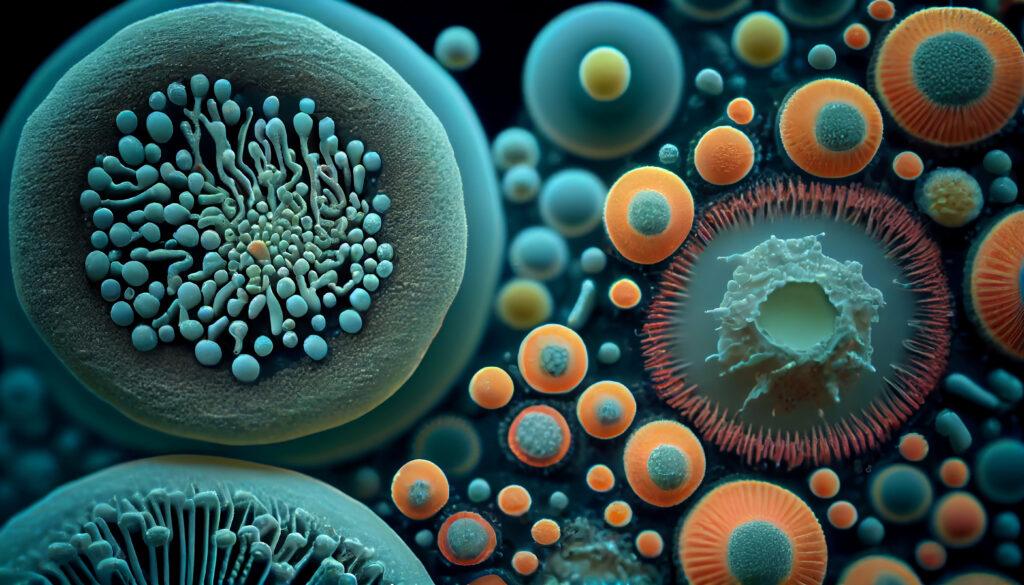Introduction to Gut Microbiome: The Microscopic World Within You
Throughout the human body, a complex network known as the gut microbiota quietly functions, going unnoticed but having a significant impact. Our general health and well-being are greatly influenced by this vibrant community of trillions of microorganisms, which includes bacteria, fungi, viruses, and more. We will delve into the many roles played by the gut microbiota in this extensive book, as well as examine how it affects immunity, digestion, and mental health. We will also learn doable strategies for creating a thriving internal ecology through diet and lifestyle choices.
Unveiling the Gut Microbiome: A Symphony of Microbial Life
The gut microbiome functions as a diverse community of microscopic inhabitants, working together to maintain homeostasis within the body, much like a busy cityscape. Important members of this microbial orchestra are viruses, fungi, and bacteria, which work together to support a thriving environment. Let us examine the functions of the gut microbiota in digestion, metabolism, and the production of vital vitamins to fully appreciate the importance of this system.
1. Digestive Dynamo: Gut Bacteria and Dietary Fiber
Helping with digestion is one of the gut microbiome’s main functions. Specific microorganisms are adept at decomposing complex substances, particularly dietary fiber, into metabolites such as short-chain fatty acids. The body uses these byproducts as an energy source and to keep the gut healthy. Consuming a diet high in fiber, which comes from whole grains, fruits, and vegetables, supplies the prebiotics required to support the development and function of these good bacteria.
2. Guardians of Immunity: Gut Microbiome and Immune Function
Our immune system is protected by the gut microbiota, which also influences the formation and upkeep of a strong defensive system. In order to enable immune cells, to distinguish between dangerous pathogens and benign substances, beneficial bacteria are essential for their training. This procedure guarantees an immune system that is properly managed and prevents unwarranted immune reactions, such as allergies.

Cultivating a Healthy Gut Microbiome: Strategies for Success
Let’s look at some doable strategies to support the health of the gut microbiome now that we are aware of its critical functions. Making deliberate decisions that encourage the development of good bacteria and preserve a balanced microbial ecosystem is part of living a gut-friendly lifestyle.
1. Diverse Diet for Gut Health
A balanced diet is essential for maintaining a healthy gut microbiota. A range of high-fiber foods, including whole grains, fruits, vegetables, and legumes, should be included. Incorporate fermented foods as well, such as kefir, yogurt, sauerkraut, and kimchi. These foods contain probiotics, which are live bacteria that, when ingested in sufficient proportions, have positive health effects.
2. Limit Sugar and Processed Foods
Consuming too much sugar and processed food can upset the delicate balance of intestinal flora, which can lead to the spread of dangerous species. To preserve a healthy microbial ecology, choose whole, unprocessed meals and watch what sugar you consume.
3. Stay Hydrated for Gut Well-being
Maintaining an ecosystem in the gut that is healthy requires proper hydration. Water helps with digestion, nutrition absorption, and general gut health. Try to stay well-hydrated and maintain the proper functioning of your gut microorganisms by drinking lots of water throughout the day.
4. Manage Stress for a Calm Gut
Prolonged stress can cause changes in gut motility, an increase in intestinal permeability, and a disturbance in the balance of microbes in the gut. Include stress-relieving activities in your regular routine, such going for a walk in the park, practicing deep breathing, or meditation. You may support a healthier gut environment by practising stress management.
5. Prioritize Quality Sleep for Gut Harmony
Getting enough sleep is essential for maintaining a balanced gut microbiota. Sleep deprivation has been associated with changes in the makeup and functionality of the gut microbiome. For the purpose of enhancing general health and well-being, aim for 7-9 hours of sound sleep per night.
You can also read “Navigating Diabetes: “9” Ayurvedic Herbs For Effective Management“
The Gut-Brain Connection: Mental Health and Gut Microbiome
New research indicates that the gut microbiota plays a major impact on mental health, in addition to immunity and digestion. The gut-brain axis, sometimes called the “second brain,” emphasizes the two-way communication between the gut and the central neurological system. The generation of neurotransmitters like serotonin, which is essential for mood regulation, is influenced by the gut flora.
1. Serotonin Production and Gut Bacteria
Metabolism produces serotonin, popularly known as the “happy hormone,” in both the brain and the stomach. It is important to highlight the connection between gut health and mental health because beneficial gut bacteria aid in the manufacture of serotonin. Neurotransmitters that enhance mood and emotional resilience are produced with the help of a diversified and well-balanced gut microbiota.
2. Gut Microbiome and Mental Health Disorders
Studies point to a possible link between mental health conditions including anxiety and depression and an unbalanced gut microbiota. Developing practices that support a healthy gut may improve mental health, while more research is required to fully grasp this complex relationship.
Conclusion: Embracing a Gut-Friendly Lifestyle for Holistic Health
In summary, the gut microbiota plays a dynamic and significant role in our general health. With knowledge of its functions in immunity, digestion, and mental well-being, we may make wise decisions to maintain a healthy internal ecology. Eating a varied and nutrient-dense diet, controlling stress, drinking plenty of water, getting enough sleep, and including foods that are good for the gut are all important for maintaining a healthy gut microbiota. By putting our gut microbiome’s health first, we set our bodies up for maximum vigour, resilience, and health. Discover the mysteries of gut health and set out to create a healthy, balanced internal ecology!



